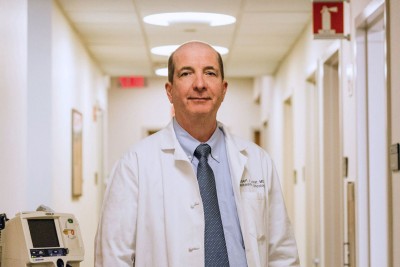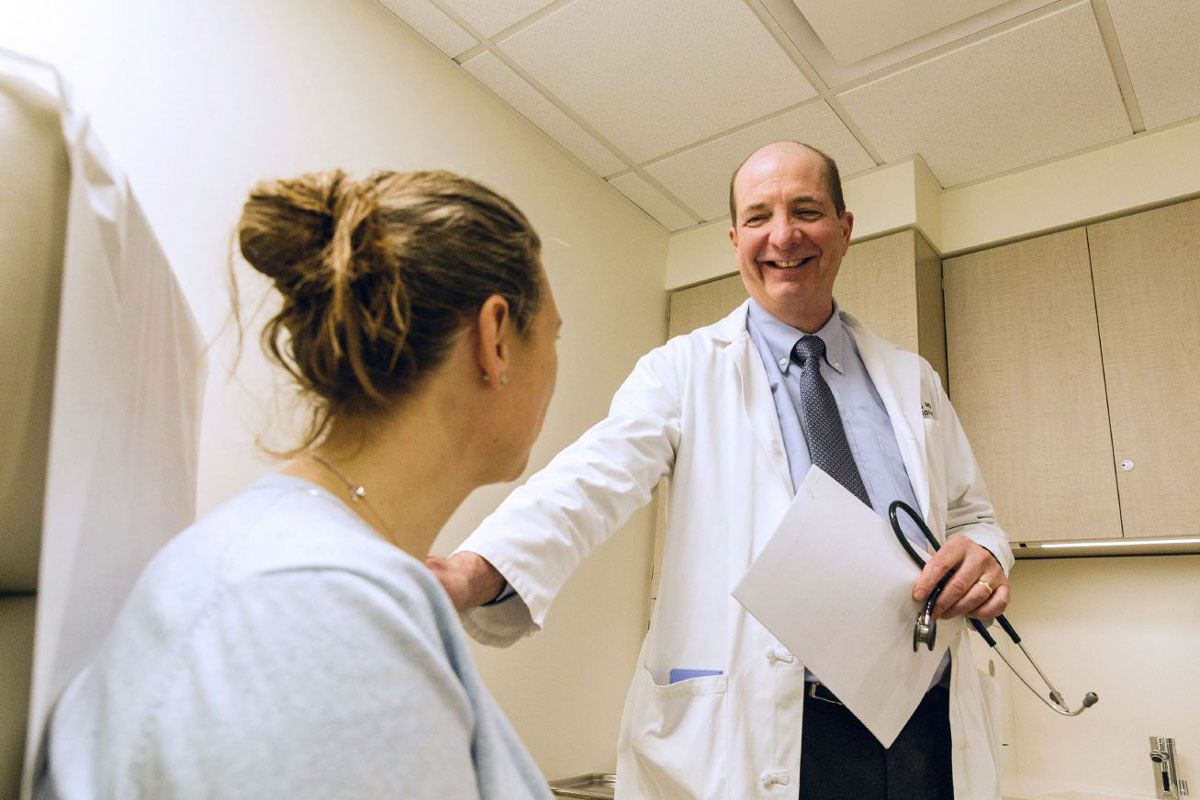
MSK’s Robert Motzer, MD
Memorial Sloan Kettering Cancer Center (MSK) researchers presented the results of a randomized phase III trial at today’s press program for the European Society for Medical Oncology’s 2018 Congress in Munich, Germany. The results demonstrated that a combination of the immune checkpoint blocker avelumab (Bavencio®) and the tyrosine kinase inhibitor (TKI) axitinib (Inlyta®) can significantly improve progression-free survival (PFS) in people who have been previously untreated for advanced renal cell carcinoma (RCC).
In the international trial, 886 people with kidney cancer from all subgroups were administered a first-line treatment. Avelumab and axitinib were administered to 442 people via IV every two weeks, while 444 people received sunitinib (Sutent®). Researchers compared the outcomes for people with tumors that were positive for programmed cell death-ligand 1 (PD-L1+). The primary outcomes compared were PFS in PD-L1+ patients and overall survival in PD-L1+ patients up to five years.
Robert Motzer, MD, a medical oncologist at MSK and lead study author, said, “The findings of this study suggest that combining an immune checkpoint blocker with a TKI is successful, compared to a TKI alone, and may be a new treatment option for people with advanced renal cell carcinoma.”
Significant adverse events were experienced by 55 percent of people in the study as a whole. Adverse events leading to the discontinuation of treatment affected 4 percent of people on avelumab plus axitinib and 8 percent on sunitinib.
Median PFS in people with PD-L1+ tumors was 13.8 months in the combination arm versus 7.2 months for sunitinib, while median PFS irrespective of PD-L1 expression was 13.8 versus 8.4 months, respectively. The safety profiles were consistent with those of prior studies of each drug; no new safety signals were observed for the combination.
“The results demonstrated longer PFS and higher objective response rate for avelumab plus axitinib compared to sunitinib for treatment-naive people with RCC,” Dr. Motzer continued. “We will plan more study around overall survival. This is the first phase III trial result that compares the combination of a checkpoint inhibitor with a TKI to standard TKI treatment with sunitinib. The positive outcome is promising for this approach to become a new standard of care in first-line treatment for this cancer.”
MSK’s Pioneering Work with Immunotherapy in Kidney Cancer
Cancer immunotherapy was born at MSK over a century ago. Since then, MSK scientists have led the effort to develop immune-based treatments for cancer. MSK has been at the epicenter of discoveries in the field, and the institution’s work is bringing exciting new treatment options to people with cancer. MSK has extensive experience in using immunotherapy to treat people with melanoma, kidney cancer, lung cancer, and other cancers, as well as in handling immune-related side effects.
On November 23, 2015, the US Food and Drug Administration approved nivolumab (Opdivo®) for the treatment of RCC — research pioneered and led by Dr. Motzer. Although nivolumab was already used to treat melanoma and lung cancer, this marked the first time that the FDA approved a checkpoint inhibitor for the treatment of kidney cancer. On April 16, 2018, the FDA approved the combination of nivolumab and ipilimumab (Yervoy®) for the treatment of people with poor- and intermediate-risk advanced RCC.
What This Means for People with Kidney Cancer

Dr. Robert Motzer speaks with one of his patients.
Despite available therapies for kidney cancer, the outlook for people with advanced RCC remains poor, with fewer than 10 percent of people surviving five years after diagnosis. It’s also a particularly aggressive disease: At the time of diagnosis, the cancer has already spread to other organs in approximately 30 percent of people, and about one-third of people whose disease is confined to the kidney will have a relapse.
In 2018, it is estimated that 63,000 new cases of RCC will be diagnosed and there will be 15,000 deaths due to RCC in the United States — and numbers are expected to rise significantly in the next decade.
“Some of the most exciting progress we are making in cancer treatment is around checkpoint inhibitors,” Dr. Motzer said. “In 2018, we have seen the FDA approve the combination of nivolumab and ipilimumab for the treatment of people with poor- and intermediate-risk advanced renal cell carcinoma, and we are continuing to study and research additional treatment options for people with RCC.”
This trial was sponsored by Pfizer and is part of an alliance with Merck KGaA, Darmstadt, Germany. People treated at MSK were supported in part by an MSK Support/Core Grant (P30 CA008748).



